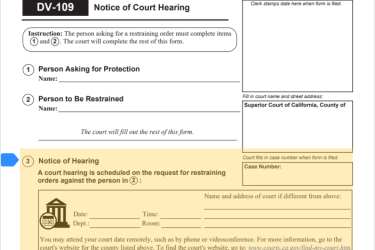What do these papers mean?
Restraining Order (DV-109, DV-100, DV-110)
If you received any of these forms, someone asked for a restraining order against you:
- Notice of Court Hearing (form DV-109)
- Request for Domestic Violence Restraining Order (form DV-100)
- Temporary Restraining Order (form DV-110)
A restraining order would limit your contact with the person asking for a restraining order and include other orders:
- If you and the other side have a child together, the restraining order can include orders for child support and custody.
- If you're married, it can include orders for spousal support.
- A restraining order could impact your life in other ways, including preventing you from having guns and ammunition.
⚠️ You have a court date where a judge will decide if they will grant the restraining order, which can last up to 5 years.
🔗 All court form links on this page open in a new tab so you don’t lose your place.

When do I go to court?
Notice of Court Hearing (form DV-109)
- This form tells you when you need to go to court.
- You have a court hearing (court date) because the person listed in item 1 has asked for a restraining order against you.
- If you do not agree to having a restraining order against you, you must go to your court date to tell the judge why you do not agree.
📅 Look at item 3 on this form to see the date, time, and location for your court hearing.
- You may attend your hearing remotely (by telephone or by videoconference).
- For information on how to attend remotely, go to the court’s website.
What is the other side asking for?
Request for Domestic Violence Restraining Order (DV-100)
- On form DV-100, the other side checked every order they want the judge to make (items 10 - 31). If you disagree with any of the orders, you must go to your court date to tell the judge why you do not agree.
⚠️ If you have a child with the other side, the judge may make orders that limit your time with your child. You may have other forms that were given to you, like form DV-105 and form DV-140.
- These papers are for custody and parenting time.
- If you do not agree with what the other side is asking related to your child, make sure to go to your court date.
Click to learn more about how domestic violence affects child custody.
Has the judge made any temporary orders against me?
Temporary Restraining Order (form DV-110)
- This form tells you if the judge made temporary orders against you.
- Look through it carefully and follow all the orders.
- If you own any firearms, firearm parts, ammunition, or body armor, see "Do I need to complete any papers?" right below for what you need to do to comply with the judge's orders.
⚠️ If you violate any of the orders you could be arrested, go to jail or be charged with a crime.
Do I need to complete any papers?
If there's a Temporary Restraining Order, you need to turn in a form saying what you did with your guns and firearms
- If there is a temporary restraining order against you (see form DV-110), you must turn in, sell, or store any firearms and ammunition you have or own.
- If you have any body armor, you must relinquish it.
- Learn more about how to comply with these orders.
⚠️ If you do not comply, you could be arrested and charged with a state or federal crime.
If the other side asked for financial support, you need to give information about your finances
If the other side asked for child support, spousal support, lawyer's fees, or for you to pay debts:
- Fill out Income and Expense Declaration (form FL-150).
- This form asks how much money you earn and what your expenses are.
- Attach proof of your income (like pay stubs) from the past two months to the form.
⚠️ Do not attach or include sensitive information, like your social security number on your court papers. Most papers you file with the court can be viewed by anyone who asks to see them at the courthouse.
Tell the judge your side of the story, in writing
While you wait for your court date, you have the option of filling out a response to explain in writing what you want to happen in the case and why.
💬 If you need help, you can go to your local self-help center.
Responding to a request for a restraining order
What's Next?
-
Obey gun orders
Learn how to comply with order to get rid of your guns and firearms.
-
Respond in Writing (Optional)
Get step-by-step instructions for how to respond in writing to explain what you want to happen in the case and why.
-
Prepare for your court date
Learn how to prepare for your restraining order court date.

